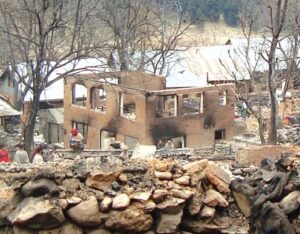
The Dream of a Martyr
Muhammad Faisal
1979 had begun. Kashmir looked abnormally normal, its calmness betraying the storm that history had quietly queued in the wings. Beneath the surface of daily life, the valley was already restless, watchful and pregnant with political premonitions.
In the northern hamlet of Tujjar Sharief, Muhammad Akbar Lone, a member of Jamaat-e-Islami Jammu and Kashmir, was in a hurry. He was rushing towards Kashmir’s southern part to meet the then Ameer-e-Jamaat Mr. Saad-ud-Din Tarbali. The night before, in a dream, he had seen himself sitting in his home when someone knocked at the door. He opened it. There stood Imam Hussain (AS)! Without a word, the Imam took his hand, and they began to walk together into an unknown distance. Then he awoke.
He rushed to meet the Ameer Sahab to seek the meaning of this dream. The Ameer heard it, embraced him gently, kissed his forehead and declared, “You will attain martyrdom.” It was a time when Kashmiris had yet to take up arms in the path of Jihad-e-Feesabilillah against Indian occupation. The idea of achieving martyrdom immediately – though not entirely unthinkable – still felt somewhat distant. But Kashmir is a land where the unexpected is always close at hand. Who can ever predict when the tide will turn, when patience will harden into resolve, and silence into a storm?
After some days (probably a week or more) that year on April 4, the news of Zulfikar Ali Bhutto’s execution pierced through the Valley. A cloud of sorrow quickly turned into a firestorm against those in the valley who had done nothing wrong to deserve all that. That grief was misdirected, misinformed, and manipulated.
In Srinagar, the National Conference, communists and Qadiyanee’s seized the public emotion and redirected it like a weapon. Bhutto was hanged, they declared, because of the Jamaat-e-Islami! No, it was the religious Jamaat that was to blame, they insisted. The accusation was absurd, but in a place where flames spread faster than facts, the damage had already begun.
That day, mobs swept through the streets like a flood uncontained. Shopian, Sopore, Baramulla, Islamabad, downtown Srinagar — from alley to avenue, the rage turned towards homes, mosques, schools, and libraries associated with Jamaat-e-Islami Jammu and Kashmir. A violent choreography had begun, and its dancers were neither spontaneous nor unled. The orchestrators watched the show silently.
Shops were looted, houses ransacked, and properties charred to ash. What made that day unforgettable was not just the destruction of homes, but the deliberate burning of minds. Copies of the Holy Qur’an were thrown into flames derided as “Jamati Quran”. Volumes of “Tafheem-ul-Quran” — Maulana Maududi’s monumental exegesis — were dragged out and set alight. It was indeed a day when ignorance masqueraded as justice.
The riots did not spare even the mosques. Mosques whom the mob thought were associated with the Jamaat were desecrated. Islamic schools were attacked. It was a painful irony: the people who wept for Bhutto were destroying the very institutions that had kept Islamic consciousness alive in Kashmir.
Behind it all stood an unholy alliance of politics and propaganda. The National Conference, never forgiving of Jamaat’s ideological influence, saw in this tragedy an opportunity to strike. With carefully planted rumors and amplified half-truths, they managed to turn popular grief into targeted hatred.
Amidst all this, Muhammad Akbar Lone, the man of the dream, was not spared either. He was on duty in a school when a mob suddenly attacked it and started setting on fire books in the library. It was a moment of shock for him and he was perhaps still not able to understand the situation around him. He took the half burnt holy book, trying save it from fire when someone from the mob struck his head with some hard object and he fell on the ground and breathed his last while holding the Quran against his chest. The dream had finally come true. He was a martyr now!



